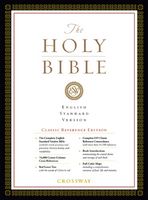
Lately I've been working on a massive bible study of the book of Galatians. As part of that study, I'm making use of every single modern English language version of the Bible I can get my hands on, plus the old reliable King James Version. Since the "English Standard Version" (ESV for short) is a new translation, I included it.
Now you must realize that my main study and reading Bible for the past 20+ years is the extremely popular New International Version from Zondervan. I purchased the very first NIV Study Bible back in 1985, and have used various versions of the NIV ever since.
Recently, though still extremely happy with the NIV, I have encountered some small (very small) flaws with the way it translates a few of the underlying Greek and Hebrew texts. Of course these flaws have been known about for years, and serious students of the bible usually use a more literal translation like the New American Standard Bible (NASB).
But I really don't like the NASB. While it may pride itself on it's literalness, it makes use of very awkwardly phrased English to bring forth the Good News. Often I find myself have to re-translate the NASB's English into something I can understand, something I never have to do with the NIV.
Well, I think I've found a literal translation that combines the literalness of the NASB with the fluidity of the NIV. With the likes of J.I. Packer and Wayne Grudem guiding the translation process, one can be sure that the English Standard Version is true to the underlying Greek and Hebrew texts as well as being very theologically accurate.
But one of the best characteristics of the English Standard Version is it's pedigree. The ESV is the latest in a long line of outstanding English language translations that goes all the way back to William Tyndale. The most recent revision in this lineage is the Revised Standard Version (RSV) of 1946. Until the advent of the NIV, the RSV was truly the best English language translation one could get. But unfortunately it was widely rejected by the evangelical Christian community because the scholars who did the translation "under translated" key texts that dealt with certain key doctrines of Christianity, including the virgin birth and propitiation. But despite these flaws (and they were really very minor), the RSV was an outstanding update of the King James Bible, and is still highly regarded by many conservative scholars, despite it's minor flaws. It is, in many ways, a much better translation than the NIV in terms of it's ability to accurately translate the underlying texts and it's use of modern English in a fluid, readable fashion.
The liberal (theologically, socially, and politically) organization known as the National Council of Churches bought the copyright to the RSV and came out with their own update, the New Revised Standard Version (NRSV). This is, for the most part, an very good update except for one major problem: it's politically correct. The translators removed any and all references to the use of male gender nouns and pronouns when they were being used in a generic fashion. For instance, this famous passage from Matthew 7 in the ESV reads:
Why do you see the speck that is in your brother’s eye, but do not notice the log that is in your own eye? Or how can you say to your brother, ‘Let me take the speck out of your eye,’ when there is the log in your own eye? You hypocrite, first take the log out of your own eye, and then you will see clearly to take the speck out of your brother’s eye.But the NRSV translators decided to make it gender inclusive:
(Matthew 7:3-5)
Why do you see the speck in your neighbor’s eye, but do not notice the log in your own eye? Or how can you say to your neighbor, ‘Let me take the speck out of your eye,’ while the log is in your own eye? You hypocrite, first take the log out of your own eye, and then you will see clearly to take the speck out of your neighbor’s eye.The underlying Greek shows that Jesus was using the Greek word for "brother," not "neighbor." But in order not to offend militant feminists, the NRSV translators removed the male gender reference. This is one example of literally thousands! Any place where a generic male example was used in any biblical book, it was neutered--literally.
(Matthew 7:3-5)
The ESV is also a "New Revised Standard Version" but without all the politically correct gender-neutral revisions. One might say the ESV is "evangelically correct!" Now there are some places where a gender neutral rendering is the correct way to go, so it's not as if the practice has to be completely rejected, but one must be careful to match the rendering to the underlying context.
During a recent visit to a local Christian bookstore I found a very nice leather bound ESV Bible for 50% off. The discount was due to a personal name that was imprinted incorrectly on the Bible! Once a name is imprinted on a leather cover, it cannot be removed or changed. So the store owner had to get another copy of the ESV and re-do the imprint, and regulated his mistake to the bargain bin. So now I have my own leather-bound copy of the ESV, with someone else's name on it.
The more I read the ESV the more impressed I am with it. I'm not sure it will replace my NIV any time soon, but I certainly plan to read more from the ESV in the near future.
Well known pastor and theologian John Piper has switched to the ESV. You can read his reasons why here .


No comments:
Post a Comment